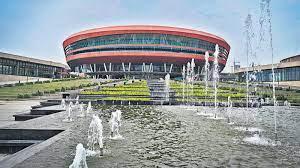
One Earth, One Family, One Future: G20's Education Initiatives
India is hosting one of the world's largest events for world leaders, known as the G20. This group comprises 20 powerful countries that collectively control more than 80% of the world's total production. Presiding over such a powerful coalition is a matter of immense pride for India. New Delhi, the Indian capital, competes with some of the world's finest cities in terms of infrastructure, and its historical significance adds to its charm. With over 1000 years of history, it has been the capital of numerous empires that have risen and fallen over time. Currently, the city seamlessly blends its rich history with modernity, and this contrast enhances its appeal.
However, this post doesn't focus on the city's beauty but rather seeks to explore educational collaborations among the G20 nations. The group of education ministers from these nations recently held a meeting and signed agreements for collaboration and cooperation.
Collaborative efforts at the governmental level are strengthened when opportunities for people-to-people contact exist. Education plays a crucial role in bringing people together among these 20 nations. Member countries have made significant strides in outlining their education priorities and identifying areas for collaboration. While the G20 primarily focuses on economic cooperation, it's essential to acknowledge that educational collaboration cannot thrive without economic considerations, and the two aspects mutually reinforce each other. Educational collaboration will further drive economic cooperation, and economic cooperation will create opportunities for enhanced educational collaboration.
The G20 has produced four significant documents on education titled:
- G20 New Delhi Leaders’ Declaration
- Education Policies and Programmes in G20 Countries One Earth, One Family, One Future through Education
- G20 Education Ministerial Meeting Outcome Document and Chair’s Summary
- Compendium:Education Policies and Programmes in G20 Countries One Earth, One Family, One Future through Education
The main document, titled "G20 New Delhi Leaders' Declaration," under the subheading of "Delivering Quality Education," states:
We are committed to inclusive, equitable, high-quality education and skills training for all, including for those in vulnerable situations. We recognize the importance of investment in supporting human capital development. To this end, we:
i. Recognize the importance of foundational learning (literacy, numeracy, and socioemotional skills) as the primary building block for education and employment.
ii. Reiterate our commitment to harness digital technologies to overcome the digital divides for all learners.
iii. Extend support to educational institutions and teachers to enable them to keep pace with emerging trends and technological advances including AI.
iv. Emphasize expanding access to high-quality Technical and Vocational Education and Training (TVET).
v. Reaffirm our commitment to promote open, equitable and secure scientific collaboration and encourage mobility of students, scholars, researchers, and scientists across research and higher education institutions.
vi. Emphasize the importance of enabling life-long learning focused on skilling, reskilling, and upskilling especially for vulnerable groups.
This statement is powerful as it begins with three key terms: inclusive, equitable, and high-quality education for all. Despite being guided by new liberal economic policies that promote income inequalities among the participating G20 members, these leaders have managed to agree on the importance of inclusive and equitable education, which is a significant achievement.
Taking up the G20 Presidency, the Government of India has proposed three priority areas under the G20 Education Working Group (EdWG). These areas include:
- Ensuring that all children are set up for life with foundational literacy and numeracy (FLN) and can enjoy opportunities for lifelong learning, by improving teaching and learning practices, including through blended learning
- Leveraging digital resources and technologies to accelerate progress in education; understanding how education systems will be impacted by the future of work, and strengthening their relevance and linkages
- Promoting closer collaboration between higher education, the research and development sector and societies, both within and across national boundaries.
The areas of collaboration have been identified as foundational literacy, the integration of technology, and cooperation in higher education. The document titled "Compendium: Education Policies and Programmes in G20 Countries - One Earth, One Family, One Future through Education" is quite intriguing. It offers a comparative overview of the educational initiatives undertaken by the member countries. It's noteworthy that within a forum primarily recognized for economic cooperation, education has secured a significant place. Member countries have committed to working together to achieve the common goal of providing inclusive, equitable, and high-quality education for all. In the upcoming year, it will be fascinating to observe the level of commitment demonstrated by these member countries in pursuit of their ambitious goals.
- Log in to post comments
